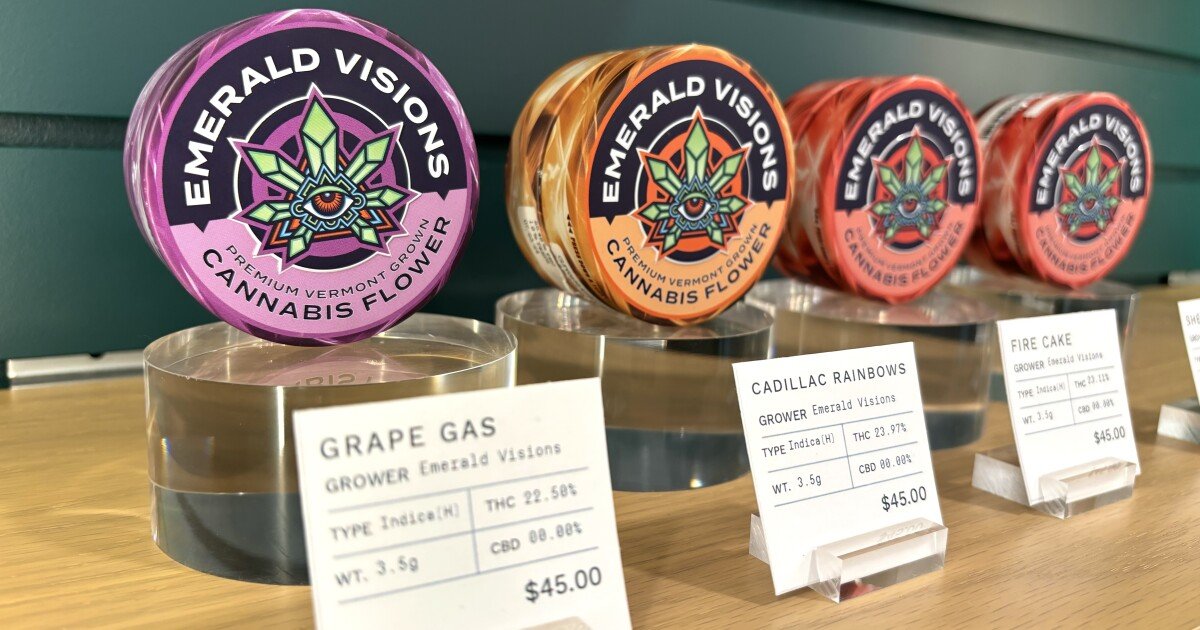Ahead of next month’s election, Vermont Public has been using a reporting initiative called the Citizens Agenda. Basically, we’ve been asking you which issues you want politicians to prioritize. And it turns out a lot of folks want to talk about taxes — and how to lower them.
“Why do they not use the tax from cannabis for education rather than raising people’s property taxes?” asked Liz Kehoe-Palumbo.
Then there are the other so-called vice taxes on programs that add revenue to Vermont’s coffers, like online sports betting and the lottery.
Property taxes are on a lot of Vermonters’ minds right now. Nearly one in three school budgets failed on Town Meeting Day. That’s the highest proportion in years, and some districts needed five votes to finally get to “yes.”
To help answer Liz’s question, Vermont Public senior political correspondent Bob Kinzel, who follows both state government and the cannabis industry, sat down with host Jenn Jarecki. We highly recommend listening to the audio. We’ve also provided a transcript, which has been edited for length and clarity.
Jenn Jarecki: I know this conversation is going to have a lot of figures, so let’s start with a really big one. How much money does Vermont spend on education annually?
Bob Kinzel: Jen, this number has been growing over the years. For instance, in 2018 it was $1.6 billion. Now it’s roughly $2.3 billion, and the big spending parts are roughly $2 billion to support local school budgets and another $260 million in special education costs.
Jenn Jarecki: OK, that is a lot of money. So Bob, how does the state raise more than $2 billion each year for the ed fund?
Bob Kinzel: There are actually a variety of ways, but there are three major sources of money. One, residential property taxes. This accounts for around $600 million. Two, nonresidential property taxes; this would be taxes on businesses and second homes. This accounts for roughly $900 million. And three, all of the state sales tax. This is about $600 million. So as we discuss alternative sources to replace the residential property tax, it’s very important to keep that $600 million figure in mind.
Jenn Jarecki: OK, so good to know. So let’s turn to cannabis. Now, how does the state tax it, and how much money does the marketplace bring in?
April McCullum
/
Vermont Public
Bob Kinzel: Jenn, there are two taxes: a 6% sales tax and a 14% excise tax. Basically, that’s a tax that’s imposed on goods, services or activities. And this year together, these two taxes will account for around $25 million – but we have to remember that this money is already dedicated to fund other programs.
For instance, the $11 million from the sales tax is used to fund after-school programs. Cannabis Control Board Chairman James Pepper says this is a very important investment.
James Pepper: There’s a direct nexus, in my view, between the times of day when kids are most likely to try to experiment with these illicit substances. You know, between 3 p.m and 5 p.m. after school when they’re not supervised; this is the opportunity to try cannabis.
Bob Kinzel: Now the state excise tax raises around $14 million a year, and about $4 million of this revenue is used for drug prevention programs. The other $10 million goes into the general fund for other state programs. So there’s really not any money available to reduce property taxes from the cannabis tax — unless you take the funding away from these other programs. And that would be very controversial.
Jenn Jarecki: The old robbing Peter to pay Paul sort of thing, right? OK, Bob, so if the state hypothetically decided to raise a lot of new money from the cannabis tax to help reduce property tax burdens, what would it have to do?
Bob Kinzel: Jenn, I asked Chairman Pepper that question, and there’s not much that can be done. He said the state could double its tax rates from 20% to 40%, but that would raise prices and drive away many people back to the legacy market. And that would result in lower sales and less revenue.
James Pepper: People are of course willing to pay a premium for a regulated product, but 20% is probably the outer limit of what the average consumer will tolerate before they look to some of these alternative markets.
Jenn Jarecki: Okay, so while we’re still on the subject of the cannabis tax, how do some of the other 23 states that have legalized retail sales use their revenue?
Bob Kinzel: Jenn, it’s really fascinating. Every state seems to have a different plan. Most states use some of the money for drug prevention and substance abuse programs, for their general fund, for law enforcement programs, for social equity programs and some for education programs. It could be K-12 or higher education. So there are many different uses of this revenue.
Hirurg/Getty Images/iStockphoto
/
iStockphoto
Jenn Jarecki: Well, let’s switch gears a bit. Bob. Could online sports betting tax revenue put a dent in education funding?
Bob Kinzel: Well, Jenn, initial estimates are between $7 and $10 million a year, and this could certainly grow in the coming years. But this is money that also goes directly — right now— into the general fund, so it’s already accounted for. And you’d have that same problem of needing to find other revenue sources to pay for existing programs.
Jenn Jarecki: What about the money the state receives from all of the lottery programs? You know, like scratch-off tickets, Megabucks, that sort of thing.
Bob Kinzel: All the lottery programs raise around $35 million a year. And as Liquor and Lottery Commissioner Wendy Knight points out, all of these proceeds already go into the education fund.
Wendy Knight: The percentage of the ed fund that the lottery fund supports is miniscule. Vermont Lottery – 100% of profits go to the ed fund, but that component is less than 2%. You’re going to need a lot more lottery revenue to make a dent in the property tax issue.
Jenn Jarecki: Well in that case, Bob, are there ways to dramatically raise lottery revenues for the state?
Laura Nakasaka
/
Vermont Public
Bob Kinzel: Jenn, there probably are. But I don’t think there’d be much support for them in the Legislature or from the Scott administration. You know, back in the early 1990s there was a well-funded proposal to develop a casino at the old racetrack site in Pownal, just south of Bennington. But it was soundly defeated at the Statehouse, and Commissioner Knight says nobody is discussing this option at this time.
Jenn Jarecki: OK, Bob, so we need $600 million to replace residential property tax revenue going to the education fund. And at best, the state is only taking in about $50 million total from cannabis and sports betting, and most of that money is already spoken for. And of course, you just mentioned that the money from the lottery already goes to the education fund. Admittedly, I’m not great at mental math, but it’s pretty clear this is not adding up.
Bob Kinzel: Bingo, Jenn — that’s the answer to Liz’s question. You’ve got to use a larger revenue source, which is why some people are considering the income tax. That’s the state’s largest revenue source by far — there’s nothing that’s close. But that change would also be very controversial, because some people feel it’s a less stable tax than the property tax. And changing the revenue source doesn’t really get at the issue of growth in spending.
This story is part of Vermont Public’s Citizens Agenda approach to election coverage. We’re asking a simple question: What do you want the candidates to be discussing as they compete for your votes? Front Porch Forum is our lead outreach partner for this project.
Have questions, comments or tips? Send us a message.




